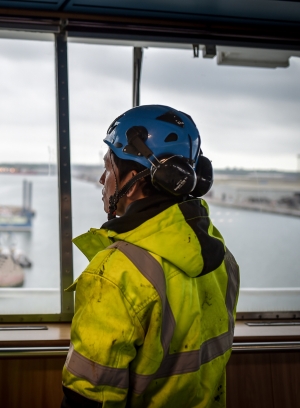


(Posted on 22/03/21)
International maritime charity Sailors’ Society’s Wellness at Sea training and support reduces anxiety and sadness among seafarers, a research report has shown.
The preliminary findings came from a PHD research project in psychology from Rhodes University in South Africa, investigating the mental health of seafarers. Researcher Lauren Brown conducted the analysis with two groups of crew, from different nationalities. The seafarers had all been at sea for less than two years, serving on a number of vessels.
One of the groups had attended a Wellness at Sea workshop and were part of a Wellness at Sea peer support programme, while the other had not attended any kind of training on wellness or mental health.
Nearly 10 per cent fewer of the seafarers who had taken part in Wellness at Sea reported feeling anxious or worried at work on a regular basis than those who had not attended any wellness training, while 14 per cent fewer of the wellness-trained crew reported regularly feeling sad at work (see notes to editors for details).
The seafarers who had been through Wellness at Sea also showed a better understanding of mental health and were less likely to stigmatise mental illness. For example, nine per cent of that group agreed with the statement “I would be embarrassed if a person in my family became mentally ill”, versus 50 per cent of the comparison group, while 26.8 per cent of the trained seafarers were embarrassed by the term “psychological disorder”, versus 55.6 per cent of the comparison group.
Johan Smith, Wellness at Sea programme manager, said: “These findings reflect what we have seen across thousands of seafarers who have completed Wellness at Sea training: even a small amount of training and support can make a big difference to a seafarer’s mental health.
“By attending just one Wellness at Sea workshop, and talking about mental health with their peers, this crew felt markedly happier at work – which doesn’t just have a good impact on their own wellness and safety, but that of the whole crew.
“Evidently, the programme also significantly changes and challenges perceptions seafarers have about mental health.
“The fact that they were less likely to stigmatise mental illness is crucially important. Breaking down mental health stereotypes brings understanding, awareness and empathy to the maritime industry while enabling seafarers to support those around them, whether at home or at sea – and making them more likely to seek help if they need it.”
Columbia Group anticipates a period of strong expansion as an increasing number of international shipowners... Read more
Norse?Ship Management has expanded its use of Smart Ship Hub’s high frequency sensor data and... Read more
As the maritime industry gears up to welcome the IMO’s STCW bullying and harassment training amendments... Read more
NORDEN has acquired the cargo activities of Taylor Maritime in Southern Africa (previously operated... Read more
Philippos Ioulianou, Managing Director of EmissionLink, has warned the IMO’s decision to delay... Read more
VIKAND has highlighted the need for cultural change in the maritime sector as reports of bullying, harassment... Read more
The maritime industry is experiencing a period of significant transformation, driven by rapidly evolving... Read more
NorthStandard has advised Members of a 5% increase in P&I premiums for the marine insurance year... Read more
Anemoi Marine Technologies, the UK-based leading designer of Rotor Sails for wind-assisted ship propulsion... Read more
Helm Operations has announced that nine electronic record books within Helm CONNECT Logbook have been... Read more